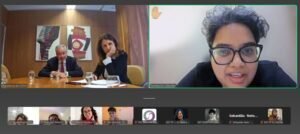Commitment made in meeting includes support for free demonstrations, including solidarity with Palestine, and closer engagement with the People’s Summit.
Belém (PA) – The president of the 30th UN Climate Conference (COP30), Ambassador André Corrêa do Lago, confirmed that he will participate in the People’s Summit on November 16, the closing day of the event that will bring together thousands of representatives of movements, networks, and social organizations from around the world in Belém. Organizations view his presence as a political advance in negotiations for the recognition of social movements in political decision-making on the climate agenda.
André Lago and COP30 Executive Director Ana Toni held a meeting with representatives of the Summit’s Political Committee on the afternoon of Monday the 11th. Present in person were Maureen Santos (Fase), Doris Vasconcelos (Pan-Amazonian Ecclesial Network – Repam), Gisele Barbieri (Brazilian Committee of Human Rights Defenders). Virtually participating were Rachitaa Gupta (Global Campaign to Demand Climate Justice – DCJ), Lise Masson (Friends of the Earth International), Francisco Kelvim (Movement of People Affected by Dams – MAB), and Miguel Izaga (Via Campesina).
“Considering that the Summit is not only a local, territorial, or national construction but broadly global involving several continents, this space of recognition and participation alongside the official COP30 event, we want to know how you are seeing, feeling, and perceiving the People’s Summit at this very important moment for the country and the planet,” Doris remarked while introducing the demands.
During the meeting, Lago recognized the importance of the Summit as a legitimate space for social movements and argued that civil society demands must be connected to the official climate conference process. He invited greater integration with the action agenda and with the envoys, channels that can incorporate the debates accumulated by the Summit.
When responding about his participation in a People’s Summit hearing scheduled for November 16 and the delivery of the People’s Summit Declaration in an official space — the document will consolidate guidelines and actions considered essential to confront the climate crisis — he was categorical in confirming.
“I am very pleased to receive the people’s declaration on the 16th. Having the reading in the official plenary would be more than natural. Including the issues you discussed, I think we must incorporate them into the action agenda. I am absolutely in favor. We have to support,” he said.
Regarding the demand presented by the Committee for credentials for social movement representatives, he said that distributing these passes is more difficult. Maureen Santos pointed out that many civil society organizations already have theirs by acting as observers, but grassroots entities do not.
Rachitaa reinforced the importance of ensuring participation beyond the groups currently contemplated, such as indigenous peoples. “It is important that these badges be distributed among leadership,” she advocated.
Beyond the dialogue on the climate agenda, the COP30 president was also urged by Rachitaa to guarantee that acts of solidarity with Palestine happen freely, since in Bonn, Germany, the UNFCCC secretariat prevented such acts in the official space.
Lago committed to addressing issues related to human rights and freedom of expression within the official conference spaces, including demonstrations in solidarity with Palestine.
“As a Brazilian, I support Palestine. At this stage, what is happening in Palestine is unbelievable. I have to check and if I have the authority to do something, I will,” he said after explaining that civil society faces restrictions in expressing itself at UN conferences and that it is essential to guarantee that historic voices, such as those defending the Palestinian people, have space and are heard.
People’s Declaration — the document to be delivered to Lago on the 16th will gather proposals built around six thematic axes covering topics such as just transition and combating environmental racism, defending cities and vibrant peripheries, food and popular sovereignty, as well as popular feminism and women’s resistance in the territories.
The People’s Summit will take place from November 12 to 16 on the campus of the Federal University of Pará (UFPA), constituting the largest autonomous and critical space of global civil society, in parallel to COP30, which will be held from November 10 to 21 in Belém. As a process, it is being organized as part of a process that will not end in 2025.
“We have been building a process because the idea is that we don’t stop in Belém, but that this Summit serves as a space for global civil society to take root, build political alliances, and convergences on essential themes,” Maureen explained.

